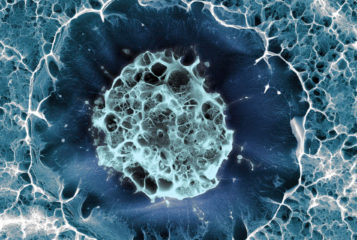Pancreatic organoids, grown using a newly developed gel, have enabled scientists to better understand pancreatic cancer.
Researchers developed a novel synthetic gel to mimic the environment of pancreatic tumour cells and grew miniature replicas of the pancreas called 'organoids' using both mice and human pancreatic cells. Historically pancreatic cancer tumours have been difficult to culture in the lab.
'The issue of reproducibility is a major one. The research community has been looking for ways to do more methodical cultures of these kinds of organoids, and especially to control the microenvironment' said Professor Linda Griffith, one of the lead authors from the Massachusetts Institute of Technology (MIT). The study was conducted by the MIT and the Cancer Research UK, Manchester Institute.
Studying pancreatic tumours in the lab is particularly challenging due to loss of cancerous properties when cells are taken out of the pancreatic tissue environment as well as the varying compositions of traditional gel batches made from ingredients derived from animal tissues, which can give rise to differing organoid structures.
The novel gel developed in this study published in Nature Materials aimed to overcome this problem, and is based on polyethylene glycol, a synthetic polymer used in medical applications as it doesn't interact with living cells.
When compared to pancreatic tumours in mice, the researchers were able to confirm the accuracy of their mouse cancerous pancreatic organoids by noting the presence of certain molecules that matched those found in the pancreas. In addition, the pancreatic organoid tissue demonstrated the characteristic stiffness associated with pancreatic tumours distinct from that seen in healthy pancreatic tissue.
Following on from this, pancreatic cells, both healthy and cancerous, were taken from human patients and organoids were cultivated using the synthetic gel. Through altering the growth factors present in the synthetic gel, researchers also suggested that their newly developed gel could grow other tissues.
Professor Griffith plans to use the synthetic gel to culture endometrial tissue in order to study endometriosis. Researchers have filed for a patent on the technology and are investigating ways to produce it commercially.
Sources and References
-
A microenvironment-inspired synthetic three-dimensional model for pancreatic ductal adenocarcinoma organoids
-
Engineers grow pancreatic 'organoids' that mimic the real thing
-
Synthetic gel grows tiny pancreases from human-derived cells
-
Tiny replicas of the pancreas may reveal weak spots for deadly cancer
-
Reproducible synthetic hydrogel scaffold supports growth of pancreatic and other tissue organoids




Leave a Reply
You must be logged in to post a comment.